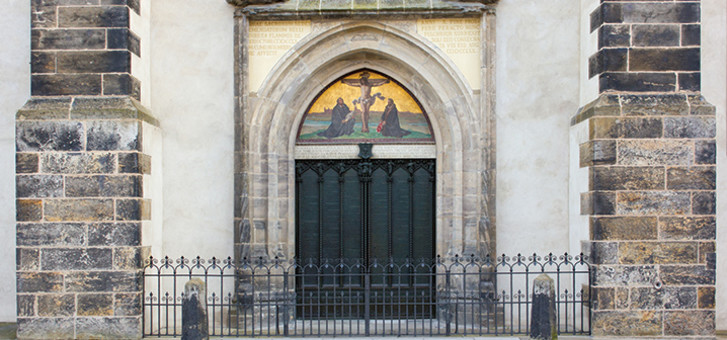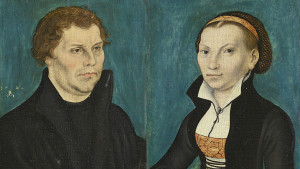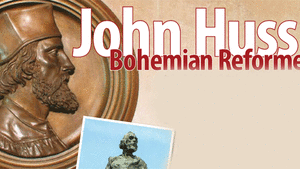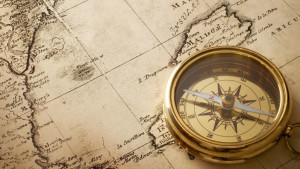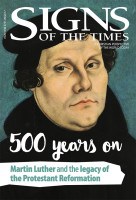This is a very special month for millions of Christians as it marks the 500th anniversary of the Protestant Reformation. It’s generally agreed that German monk, Martin Luther, nailing his 95 theses to the door of the Wittenberg Church on October 31, 1517, marked the beginning of the Protestant Reformation, leading to a schism within the Roman Catholic Church.
But what of the Reformation is relevant today, five centuries later? To understand this, it’s helpful to look at what life was like in Europe before the Reformation.
To a large extent life for the general population revolved around and was controlled by the church. Church services were presented to the congregation in Latin and ordinary people were forbidden to read the Bible (a majority of them did not understand Latin and were illiterate anyway). Only the priests and monks could read and interpret the Bible. A vast amount of property was held by the church, from which it received an income. In Britain, during the time of King John in the 1200s, one tenth of the country’s gross domestic product was returned to the pope. By the fourteenth century, the pope was receiving some five times the revenue of the king.
The rule of kings and princes was subject to that of the pope, causing conflicts. Ultimate control over society was exerted via interdicts (prohibitions), and marriages and burials had to be conducted as religious services by the church. With such controls, corruption was rife. For example, in the time of the Medicis, an Italian banking family who rose to political and religious prominence in the fifteenth century, the title of “pope” went to the highest bidder. Simony, the buying or selling of an office of the church or a sacrament, expressly forbidden in the Bible, was rife. Emboldened by what was happening in the upper echelons, many priests became corrupt themselves. It was because of such unscrupulous activities and oppression by the church that people demanded change.
Martin Luther, when he began to call for reform, never dreamed of beginning a new church. But his protests were hardly incidental. They were aimed not only at the practices of the church but also at its teachings and role in a person’s salvation. The process he began extended into the fairly rapid establishment of a number of denominations, including Anabaptist, Calvinist, Huguenot, Moravian and Church of England, followed by other Protestant spinoffs such as the Puritan movement in England.
So what legacy of the Reformation, at least in Protestant countries, is observable today? Central is that of belief, but there are also very persistent political, social and commercial aspects, largely unrecognised, that make up life as we know it.
Belief
The Bible is central to Protestant faith, as opposed to church tradition, and is now easily available. Prior to the Reformation the Bible was not the final authority for doctrine nor was it accessible. Doctrinal belief was a composite of papal declarations and deliberations of councils. Post Reformation, tradition was rejected when it contradicted what the Bible taught.
"Martin Luther, when he began to call for reform, never dreamed of beginning a new church. But his protests were hardly incidental."
Salvation is found only in Jesus: by faith in Him, and unearned, not for sale. Salvation is not something earned by performing penances or purchased via indulgences, but by belief in the death of Jesus Christ on the cross on behalf of the believer. This is closely related to the next point.
Jesus Christ is at the centre of our existence—our life now and eventual salvation. The Bible teaches that Jesus Christ is the Creator of our world. He is truly God and only a Creator could make atonement for our revolt against His order, which sin is. Salvation is only in Christ. As such, He is the only Mediator between humankind and God. Believers require no priestly or ecclesiastical intermediaries. We reach God directly in the name of Jesus, through prayer, confessing our sins to Him, not a middle person. And only God can forgive sin.
Only the grace of Jesus Christ can save us. Saved by faith alone was the catchcry of the Reformation. The Bible is clear that even the mightiest and most devoted—the saints, those holy men of God, as the Bible puts it—among us, can do nothing to save either themselves or us. “Even if Noah, Daniel and Job were in it, they could save neither son nor daughter. They would save only themselves by their righteousness” (Ezekiel 14:20). The saints of past ages, even Mary, the mother of Jesus, cannot dispense saving grace: “Salvation is found in no one else, for there is no other name under heaven given to mankind by which we must be saved” (Acts 4:12).
Society
The Reformation triggered the so-called Counter Reformation, which was pushback by the Roman church, accompanied by religious wars that ravaged Central Europe for decades.
At the heart of the Roman Counter Reformation was the restoration of authority and exertion of control—personal and societal—of the Roman church over Europe. Church and state are now separate in the West, with churches exerting relatively little influence on personal lives. Religious liberty was not a concept pre-Reformation, but has a high priority these days, and we take it for granted in the West.
A still obvious result is the division of Europe into its largely Protestant north and the Catholic south. This was the basic divide at the end of the Thirty Years War (1618–1648), which began as a religious war—Catholic versus Protestant—then devolved into something more political, the dissenting countries attempting to free themselves of Austrian Hapsburg rule. It devastated much of Central Europe, and bankrupted most of the participants.
Out of Europe
The settling of the New World wasn’t just by the Puritans, but owes much to them. The early Puritan movement (late 16th–17th centuries) in England arose from the Reformed or Calvinist churches and the Church of England. It was a movement for reform in the recently established Church of England, which the Puritans wished might more closely resemble the Protestant churches of mainland Europe, especially Geneva. The Puritans objected to the continued presence of ornaments and ritual in the Church of England, labelling such as idolatrous or “popish.” Forced to flee England under persecution because of their opposition, they made their way, via the Netherlands, to North America. They established the Boston colony, and eventually the country, with laws enshrining religious freedom, something previously unknown.
On the other hand, some of Luther’s attitudes and writings were clearly racist, and so in the Nazi takeover of Germany in the 1930s, Protestants were far more likely to vote for the Nazis than their Catholic counterparts. Also, regrettably, many German Lutheran clergy and theologians used Luther’s publications against the Jews to justify the policies of the National Socialists.
The power of the press
The Reformation coincided with the invention of the moveable type press, which Gutenberg used to produce the first printed Bibles, making them accessible to the people. Recognising the power of the press, Luther made his own German Bible translation (1534). His work continues as a key influencer of Standard German. The Reformers used print to great advantage, not only encouraging literacy but exploiting it; a hinge in history. From 1517 onward, religious pamphlets flooded Germany and much of Europe. There were more than 10,000 publications by 1530, with some 10 million copies. The Reformation was arguably the world’s first media revolution, propagating the Reformation agenda, particularly in Germany.
Innovation explosion
Along with higher literacy came an interest in academia, with increased school enrolments, accompanied by a more equitable inclusion of females and public spending on schooling. Other disciplines also flourished. Greater entrepreneurship—thanks to the “Protestant work ethic”—among religious minorities in Protestant states was an indirect consequence. But this shift continued to spark invention and ingenuity in those states, creating wealth for both the individual and the government. Significant industries were established by ethically-minded Protestant industrialists, including Waterford Crystal, Cadbury and, more recently, Oxfam.
The future
The reformers built a firm foundation, comprised of solid theology at its heart and a free-thinking, liberated society as its consequence. They left us a clear understanding of how humankind is saved, through Whom it is saved, and reinstated the place of the Bible and its teachings, according to their best understanding and diligent study.
While the 500th anniversary might seem like a good time to wind back some of that which divided Christianity five centuries ago and to move into a more ecumenical relationship, that which divided in the past was largely based on clear Bible teaching, which hasn’t changed. Of course, there’s no need for sectarian hatred—that’s plainly unchristian—but for those who recognise God’s influence over the Protestant reformers, the Bible is paramount. No human authority can change that.

